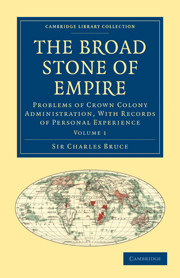 The Broad Stone of Empire
The Broad Stone of Empire Book contents
- Frontmatter
- Contents
- PREFACE
- CHAPTER I THE CROWN COLONIES
- CHAPTER II OUR NATIONAL POLICY, 1815-1868
- CHAPTER III OUR NATIONAL POLICY, 1815-1868—Continued
- CHAPTER IV OUR COLONIAL POLICY, 1815-1868
- CHAPTER V OUR IMPERIAL POLICY, 1868 AND AFTER
- CHAPTER VI THE COLONIAL OFFICE
- CHAPTER VII THE COLONIAL GOVERNOR
- CHAPTER VIII LOCAL GOVERNMENT
- CHAPTER IX LAW
- CHAPTER X LABOUR
- CHAPTER XI RACE
- CHAPTER XII HEALTH
- CHAPTER XIII HEALTH—Continued
- CHAPTER XIV HEALTH—Continued
- Plate section
CHAPTER V - OUR IMPERIAL POLICY, 1868 AND AFTER
Published online by Cambridge University Press: 05 August 2011
- Frontmatter
- Contents
- PREFACE
- CHAPTER I THE CROWN COLONIES
- CHAPTER II OUR NATIONAL POLICY, 1815-1868
- CHAPTER III OUR NATIONAL POLICY, 1815-1868—Continued
- CHAPTER IV OUR COLONIAL POLICY, 1815-1868
- CHAPTER V OUR IMPERIAL POLICY, 1868 AND AFTER
- CHAPTER VI THE COLONIAL OFFICE
- CHAPTER VII THE COLONIAL GOVERNOR
- CHAPTER VIII LOCAL GOVERNMENT
- CHAPTER IX LAW
- CHAPTER X LABOUR
- CHAPTER XI RACE
- CHAPTER XII HEALTH
- CHAPTER XIII HEALTH—Continued
- CHAPTER XIV HEALTH—Continued
- Plate section
Summary
It has been justly remarked that the more closely one studies history, the more fully one recognises that all divisions into epochs or stages, marked by events such as the accession of sovereigns or the foundations of institutions, have in them something arbitrary. If then I adopt the formation of the Royal Colonial Institute as a landmark in colonial history, it is merely because it brought into focus some leading characteristics of a period of transition between a policy which believed our colonies to be both mischievous and useless and a policy which held them to be both politically and commercially necessary.
The Royal Colonial Institute had its origin in a revolt of the national conscience against the policy of laisser faire; in a conviction that the Empire means the deliberate and reasoned union of a self conscious community rather than a collection of indeterminate atoms, and that the administration of an empire must be guided by the principle,—Imperium servatur non ratione imperii sed rationis imperio. The founders of the Institute included representatives of the self-governing colonies, India, and the Crown colonies, men who had held high office in colonial administration, and members of the Imperial legislature who had taken part in the discussion of the leading questions of colonial politics.
- Type
- Chapter
- Information
- The Broad Stone of EmpireProblems of Crown Colony Administration, With Records of Personal Experience, pp. 146 - 169Publisher: Cambridge University PressPrint publication year: 2010First published in: 1910
